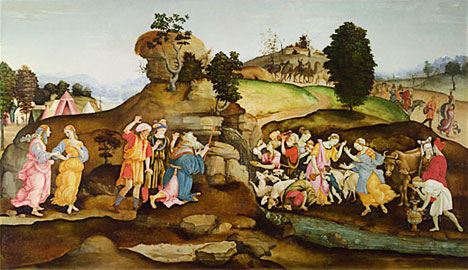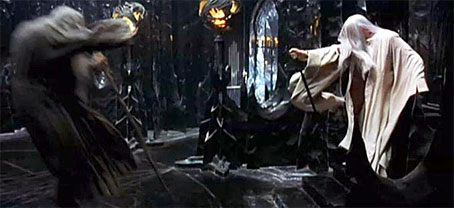Mar
30
2011

Psalm 11 seems a simple one to break down. As usual, once the structure is parsed, the author’s allusions are allowed to shine. The odd progression of the subject matter of the song suddenly makes sense. Now, remember we are dealing with poetry. All those silly rules you learnt at Bible college don’t apply. But all those good rules you learnt in English class do apply. The context is the Covenant, and Covenant breakers, and all the allusions are drawn from the history of the Covenant so far. It all takes place inside the tent of God and the Land of God, because that is where judgment begins.
Genesis – Creation – Day 1 – Sabbath
In the LORD (Transcendence)
…..I put my trust; (Hierarchy)
……….How can you say to my soul, (Ethics)
…..“Flee as a bird (Sanctions)
to your mountain”? (Continuity)
Continue reading
2 comments | tags: Chiasm, Covenant curse, Covenant Theology, Creation Week, David, Feasts, Literary Structure, Psalms | posted in Bible Matrix, Biblical Theology
Dec
10
2010

If the Bible Matrix premise is correct, there’s an entire channel of communication in the Scriptures which scholars have overlooked. How cool is that? Well, this particular one is pretty hot, actually… Continue reading
5 comments | tags: Literary Structure, Psalms | posted in Bible Matrix, Biblical Theology, Totus Christus
Oct
19
2010
or Correspondence Will Be Entered Into

The recent Australian federal election resulted in a hung parliament, with the balance of power held by a small number of elected independents. Not being forced to toe the party line, each of these men is free to stand for the needs of his own electorate. This can certainly slow down the process of government in the courts of men, but not in the courts of God.
As Christians, we are taught to toe the party line. This is a false piety. Our Father actually loves a lively, argumentative parliament. The process of maturity is supposed to bring us to the point where we are wise judges whom He can include in His government (pictured in baptism), standing on the crystal sea as joint heirs with His Son, Great Prophets whose very words change history.
Back room deals and bargaining with God are an abuse of prayer. Or are they? Not when those disputing with God are men whose hearts are like those of the Father. Abraham and David did it. God’s desire is that we should be like them. Continue reading
1 comment | tags: Abraham, Ascension, David, Doug Wilson, John Bunyan, John Piper, Parenting, Prayer, Psalms | posted in Bible Matrix, Biblical Theology, Christian Life, Quotes
Sep
3
2010
or Insanity and Spiritual Songs

Van Gogh’s work has been regarded by some as “hallucinatory,” however his letters show that few artists were as intelligent and rational. His work was not the product of his dark times but of his struggle against them.
“I am feeling well just now… I am not strictly speaking mad, for my mind is absolutely normal in the intervals, and even more so than before. But during the attacks it is terrible—and then I lose consciousness of everything. But that spurs me on to work and to seriousness, as a miner who is always in danger and makes haste in what he does.” [1]
Continue reading
Comments Off | tags: Covenant Theology, Evolution, Hebrews, Jeremiah, John Piper, Martyrdom, Mission, Noah, Paul, Persecution, Poetry, Psalms, Ray Sutton, Van Gogh, Vindication | posted in Bible Matrix, Biblical Theology, Christian Life, Creation, Quotes
Aug
23
2010
Psalm 114 – Family of Blood

Psalm 114 is one of those weird passages of Scripture that makes you wonder if the author was high on something. Without an understanding of the significance of the place of this song among these seven Psalms, the lyrics appear to be either the overly-clever, sophomoric crypticism of an ancient Bono or the fragmented derivatory prattlings of a madman.
Continue reading
4 comments | tags: Babel, Egypt, Literary Structure, Numbers, Peter Leithart, Psalms, Zechariah | posted in Bible Matrix, Biblical Theology
Aug
18
2010

“I am the Door.”
The second part of both the Covenant and matrix structures concerns the authority of the transcendent God being delegated to His servant. Very often, a book of prophecy begins with a vision of the Lord, which promptly knocks Adam onto his face as a dead man, and the destroyer passes over him in the darkness. He is “waters divided.” He is called to be separate from the world, and this sanctification begins with mortification. [1] So Psalm 112, as the second in this Covenant song-cycle, concerns the outcome in the world of the faithful use of God’s authority by His Adam.
Comments Off | tags: Passover, Psalms, Solomon, Systematic typology | posted in Bible Matrix, Biblical Theology
Aug
17
2010

Here’s my go at the structure of the first of these seven praise psalms. (The introduction is here.) Apparently, it has five verses, following the Covenant structure. Within this, each stanza also has five lines, which echo the same structure while maintaining the theme of the stanza. The only exception is verse 4 which concerns the Sanctions. It has seven lines. As I maintain, the 5-point Covenant model expands into the 7-point matrix as Ethics gets split into three: Law opened/Death under the Law/Resurrection fulfilling the Law. 5-point Word creates 7-point History. The Sanctions correspond to the Day of Atonement (Conquest) which has the theme of the resurrected body ascending to govern under God. On that Day, every year, Israel died and rose again.
Comments Off | tags: Psalms | posted in Bible Matrix, Biblical Theology, Creation
Aug
16
2010

Psalms 111 to 117 are the “Praise the Lord” psalms, an obvious unit due to the repetition of that phrase. Are they arranged in any order, or is there some internal logic going on? You know what I’m going to say next, don’t you?
Continue reading
2 comments | tags: Fractals, Literary Structure, Psalms | posted in Bible Matrix, Biblical Theology
Aug
2
2010
or The Art of Noise

Must be wizards week!
For the word of God is living and powerful, and sharper than any two-edged sword, piercing even to the division of soul and spirit, and of joints and marrow, and is a discerner of the thoughts and intents of the heart. (NKJV) Hebrews 4:12
But someone will say, “You have faith, and I have works.” Show me your faith without your works, and I will show you my faith by my works. (NKJV) James 2:18
The firmament was a veil to hide God’s throne from Man until he was ready to see God face to face. Of course, we see types of this throughout the Bible, Job, Jacob and Moses being notable examples. But no man had seen God until after Christ ascended and was presented as Facebread.
Your face is a veil of flesh that hides your brain, the source of your intentions. Your head is a microcosm of the Tabernacle at one level, and your entire body at another. You are a Garden and a Land.
Deceivers mask their true intentions with facial expressions and body language. Good spies can even pass a lie detector test. Between their true intentions and the flesh that is supposed to be communicating it, there is a deliberate disconnect. As in the Garden, it is the mind of a beast speaking with the eyes and mouth of a man.
Continue reading
Comments Off | tags: AD70, Cain, Doug Wilson, Martyrdom, Oswald Chambers, Psalms, Tabernacle, Veil, Worship, Zechariah | posted in Bible Matrix, Biblical Theology, The Last Days
Jul
28
2010
 The Distress of the Covenant-keeper
The Distress of the Covenant-keeper
Dear friends, don’t be surprised or shocked that you are going through testing that is like walking through fire. (CEV) 1 Peter 4:12
The Covenant documents are the foundation for history. God sets things in motion, like any good farmer, and returns later to pour out the promised blessings or curses, to separate the wheat from the weeds. To be under Covenant is to be under these Words, to be transformed through testing into the shape given in blueprint on the mountain. This necessary process of being sifted like wheat is both personally and communally distressing.
From Douglas Green:
The most frequently recurring Psalm form is the lament. Out of 150 psalms, 50 concern individual lament and another 70 concern communal lament. That’s almost half the Psalter.
If the Psalter is a poetic portrayal of life in Covenant fellowship with God, then it is a lamentable life. It is a life with a surprising amount of hardship and suffering, conflict and pain, or to use Philip Johnson’s summary word, distress.
Continue reading
Comments Off | tags: Lament, Psalms | posted in Biblical Theology, Christian Life, Quotes



































